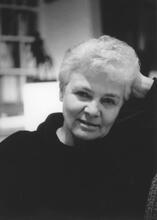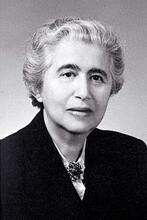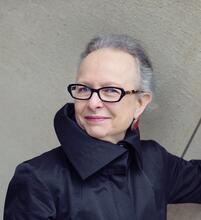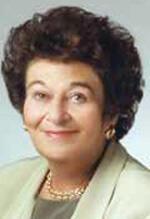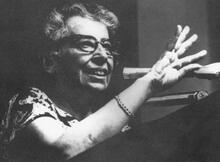Gertrude Hirschler
A celebrated translator of deft skill and a woman of great principle, Gertrude Hirschler refused to translate, edit, or publish any book that did not mesh with her ideals or beliefs. She focused her career on Jewish publishing, first as a staff member of the Baltimore Jewish Council, then as assistant editor for both the Encyclopedia of Zionism and Israel and for Herzl Press. Beginning in 1972, she lectured at the Theodor Herzl Institute, and she served as a freelance translator, writer, and editor throughout her career. A perfectionist, Hirschler made sure her translations were true to the original and did extensive research to ensure accuracy. Hirschler’s literary contributions are highly regarded in the areas of Jewish history, the Holocaust, religious literature, and Zionism.
Not prepared to compromise her ideals by accepting work that did not meet her ideological approval, Gertrude Hirschler rejected the offer of a well-recognized publisher, who submitted a book by an Israeli leftist writer to her for translation. True to her principles, she removed her name from The Hirsch Siddur that she had translated, due to changes to the finished product that did not meet her standards. A brilliant perfectionist, Hirschler’s literary contributions as a translator, editor, and writer are highly regarded in the areas of Jewish history, accounts of the Holocaust, religious literature, and Zionism.
Early Life and Education
Gertrude (Raizel) Hirschler was born in Vienna, Austria, on August 11, 1929, and was the elder of the two daughters of Alice Dukes and Bernard Hirschler. Her mother attended gymnasium. Her father ran a successful household goods business in Austria, and the family led an aristocratic, well-to-do life there. After fleeing Nazi Europe, the family arrived in Baltimore, Maryland, in 1939. As refugees, the economic situation was difficult.
Valuing Jewish studies, Hirschler attended Baltimore Hebrew College and Teachers Training School from 1942 to 1945. She graduated from Johns Hopkins University night school with a B.S. with honors in 1952.
Career
Hirschler’s positions of employment were of Jewish significance: staff member of the Baltimore Jewish Council (1948 to 1955), free-lance translator (1955 to 1994), assistant editor for the Encyclopedia of Zionism and Israel (1965 to 1971), assistant editor for Herzl Press (1965 to1976), lecturer at Theodor Herzl Institute (1972 to the late 1980s), and free-lance author and editor (1971 to 1994).
Orthodox and observant, she lectured at numerous organizations and synagogues. Her writing abilities were respected by some of the foremost Orthodox scholars of the century. She took pride in being a descendant of Rabbi Akiva Eger. She was a member of Emunah Women and Bar-Ilan Women’s Organization.
Publications and Legacy
The scope of Hirschler’s publications is diverse. In the realm of Jewish history, they include translator of Selma Stern’s Josel of Rosheim (1965); editor of Solomon Zeitlin’s The Rise and Fall of the Judaean State, Vol. 3 (1978), Esra Shereshevsky’s Rashi: The Man and His World (1982), and Yeshiva University museum’s catalog Ashkenaz: The German Jewish Heritage (1988); and author of articles in the Encyclopedia Judaica and Lexicon des Judentums. Some of her works in the area of Holocaust literature are translator and editor of Simon Zucker’s The Unconquerable Spirit (1980) and editor of Rabbi Alter Pekier’s From Kletzk to Siberia (1985) and Adam Starkopf’s There Is Always Time to Die (1981). In the field of religious literature, her writings are widely acclaimed, especially her translations of Rabbi Samson Raphael Hirsch. Her works include translator of Rabbi Hirsch’s T’rumath Tzvi: The Pentateuch (1986), The Psalms (1978), Chapters of the Fathers (1979), and Rabbi Alexander Z. Friedman’s Wellsprings of Torah (1969); author of To Love Mercy (1972). Hirschler’s publications on the study of Zionism include assistant editor and contributor of over fifty articles to the Encyclopedia of Zionism and Israel (1971); coauthor of Menahem Begin: From Freedom Fighter to Statesman (1979).
Hirschler’s lucid translations were true to the authors’ original ideas. When editing, she researched and rewrote, insisting upon accuracy. As an author, her words were precise. Her interests in Jewish history and literature were wide and varied. Through her editorial and translation works and her own writings, she left a significant legacy.
Gertrude Hirschler died in 1994.
Birnbaum, Jacob. “Gertrude Hirschler: Jewish Scholar Dies.” The Jewish Press, February 18, 1994.
Eckman, Lester. Telephone conversations with author, November 9 and December 14, 1996.
Hecht, Ida. Telephone conversation with author, November 24, 1996.
Kestenberg, Vera. Telephone conversation with author, December 8, 1996.
Preschel, Tovia. “Gertrude Hirschler, Author, Translator and Editor.” Parts 1–3. The Jewish Press, March 4, 11, and 18, 1994.
Weinberg, Chana. Conversation with author, November 14, 1996.
WWIAJ (1980).
Who’s Who in World Jewry (1987).


